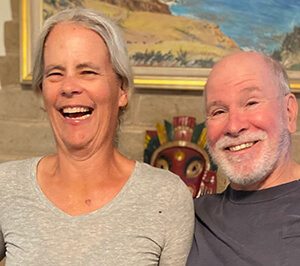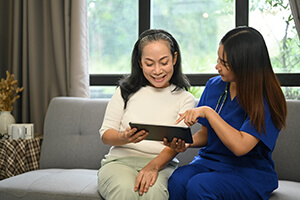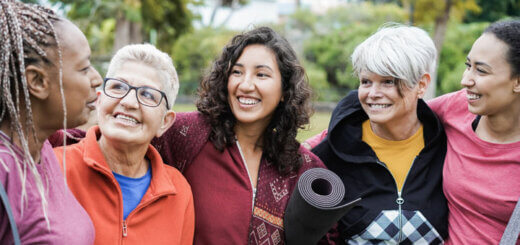Feeling like a couple again: The benefits of hiring a caregiver
By Kristina Hodge, RN
Cece has been living with Alzheimer’s disease since 2019. Cece’s husband Paul spent the first few years of Cece’s diagnosis trying to balance the roles of husband and primary care partner. As Cece’s symptoms progressed, the couple made the decision to hire outside caregivers to provide additional care for Cece. Having the extra help relieved a great deal of stress for Paul, strengthened the couple’s relationship and provided support and companionship for Cece.
Getting diagnosed
Cece’s initial reaction to being diagnosed with Alzheimer’s disease was, “You’ve got to be kidding me. I’m way too young.” In 2019 at the age of 55 years old Cece was diagnosed in the early stages of younger-onset Alzheimer’s disease. An individual can be in the early stage of Alzheimer’s disease at any age but younger-onset is defined as having symptoms starting under the age of 65 years old.
For Cece, there had been signs leading up to her diagnosis. She had experienced some difficulty driving as well as focus issues in her position as an environmental planner for a public works department. Paul shared his memory of Cece’s last day of work, “You went into a meeting and got up in the middle of the meeting, because it wasn’t tracking, and said ‘Yeah, I need to go home’”.
Becoming a care partner
Paul provided all of the caregiving for Cece for the first two and a half to three years. Paul recalls what an adjustment that was for both of them, especially during the COVID-19 pandemic. “We were together 24/7, we got on each other’s nerves. It was a huge change. I’m helping her get her food, get dressed, helping her with bathing. I’d never done that before and she’d never had it done for her.”
Cece was a thriving single-mother when Paul met her and he loved how capable and independent she was. Cece has always loved hiking and walking the dog and Paul expressed how it was part of her regular routine. “Cece was an independent hiker,” said Paul. “Almost every day [she would] take a hike for a mile or two, drop the dog off and stay out for another hour.” It was during one of these hikes that an event occurred which helped the couple make the decision to look for outside caregiving help.
Looking for help
During one of her normal daily hikes, Cece veered off her regular route and found herself waist deep in vegetation, water and poison oak. Luckily, Cece and the dog had GPS trackers on them so Paul was able to find her. Paul recalls, “By the time I got there it was starting to get dark and there was a coyote circling her.” It was this incident that started the couple’s search for someone who could help relieve some of the caregiving duties from Paul and also provide companionship for Cece.
Finding the right caregiver can be difficult and often takes time and patience. In the beginning of their search Cece was dealing with the overwhelming emotions that can occur when there is a loss of independence. Cece explained, “I’m an adventurer, I’ve always been an adventurer, I’m in a situation where I can’t do that and it’s no fun.” These emotions caused her to reject more than one caregiver that they interviewed. Looking back Cece now states, “I was in denial.”
Eventually, with the help of their life coach, the couple found an outside caregiver that Cece was able to bond with. The life coach brought the potential caregiver to the house and sent Paul off to take a nap. Next thing he knew he had a video sent to him of Cece and the caregiver interacting. Paul said, “[In the video] they’re standing in the kitchen, they’re laughing and joking. I would not have anticipated that she would bond immediately with someone.”
Since then the couple have been through a handful of caregivers but have always been able to find someone that Cece could bond with.
Caregiver stress
There is a very high instance of depression and anxiety in the caregivers of people living with Alzheimer’s and other dementias. Not only can being a caregiver affect your mental and physical health but it can cause social isolation and affect the relationship between the caregiver and the person living with the disease.
Paul talked about the difficulty trying to be a care partner and husband for Cece at the same time. Paul said, “A caregiving spouse and the role of a spouse are almost inconsistent, they don’t sit together well.”
The benefits of getting help
Once the couple started having caregivers come into the home the benefits became apparent. Paul expressed, “After a while having a professional come over and do some of the basic things [with Cece] allows me to have more time for myself, to rejuvenate and to be here as a husband and not a caregiver, it improves our relationship.”
Paul also described what he has learned from being around professional caregivers. “I’ve learned a lot from watching the caregivers. The phrases [they use] are really good- would you like to; which one of these do you like? Simple choices, either/or, yes or no. They maintain a level of cheerfulness and professionalism that I’m trying to emulate.”
Having outside caregivers has provided additional benefits for Cece beyond help with basic needs. The couple talked about how they have had caregivers take Cece swimming, to the movies and shopping, to buy gifts and provide social interaction and companionship.
More than just extra help
Making the decision to hire a caregiver and finding the right one can be challenging and take time. Cece’s advice, “If you want to have a caregiver, you need them to have [an interest] in the same things you are interested in. You need to check them out, you aren’t going to just dive in, it’s kind of like dating.” Having outside assistance provides benefits for both the person living with Alzheimer’s and the care partner who has been caring for them. As an added benefit, the right caregiver can often become more than just extra help, as Cece said, “If you get a good caregiver, they become part of the family.”
Are you experiencing caregiver stress? Take a caregiver stress check and get more information about caregiver health. For more information, questions or to speak with a live person please call our 24/7 Helpline 800.272.3900.





















Thank you both for daring to share such personal details of your journey. You sound just as caring and loving as the first day I came to know you both.
Blessings.